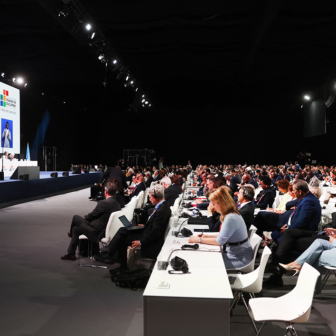Big tech could be in for a shake-up, with the Biden administration appointing two well-known antitrust (or anti-monopoly) hawks to key roles. Lina Khan and Tim Wu, academics whose relative youth earned them the moniker of “antitrust hipsters,” are now in the box seat of US antitrust policy, with potentially global implications. And it’s not just tech companies in the firing line — these appointments signal a shift away from America’s light-touch approach to regulating market power.
Lina Khan, a Columbia Law School professor, has been nominated to join the five-member board of the Federal Trade Commission, one of the two key US agencies responsible for preventing businesses from acquiring and abusing monopoly power. Even before she finished her law degree, Khan was a high-profile critic of the antitrust enforcement machine. An article she wrote for the Yale Law Review questioning the risks of Amazon’s ever-growing reach went viral and led to a surge of interest in the strategies the big tech platforms were using to supercharge their dominance.
Tim Wu, also a professor at Columbia Law School, will join Biden’s National Economic Council as special assistant to the president for technology and competition policy. In 2019, he published an (appropriately) small but powerful book, The Curse of Bigness: Antitrust in the New Gilded Age, drawing parallels between the tech platforms and the powerful oil and steel barons of the late nineteenth century. Antitrust laws, he argued, had failed to protect American consumers and society from their dominance.
Given the hipsters’ concerns about the power of big tech, these appointments have been seen as a shot across the bows of the FAANGs — Facebook, Amazon, Apple, Netflix and Google. Biden signalled during the election campaign that he would be open to breaking up these companies, and Wu and Khan have indicated they believe the government should be more willing to use its divestment powers, last used to break up the national AT&T telephone network in the 1980s.
But carving up the tech businesses without damaging their offer to consumers isn’t straightforward. All of the FAANGs rely to some degree on “network effects,” whereby consumers derive benefits from the fact that many other consumers or businesses are on the platform offering them the products, apps or services they are looking for. The easiest option would be to require FAANGs to divest the formerly competing businesses they have acquired in recent years, such as Facebook’s WhatsApp and Instagram, and Google’s YouTube.
Breaking up the tech companies’ core businesses would be highly complex. The regulator would need to prove in court that they had breached anti-monopoly laws and the court would need to force a break-up. The slow pace of complex antitrust litigation and the inevitable appeals could stretch out this process for a decade or more.
But the government and regulators can wage the battle of big tech market power on many other fronts. They could be far more active in preventing the big guys from buying emerging competitors (a preferred strategy of Facebook and Google). They could introduce restrictions on the tech companies competing with the businesses that use their platform to sell their products (Amazon and Google). And they could restrict the companies’ use of their growing trove of consumer data.
Because the United States is the home of the tech companies, actions taken there will have implications for consumers and businesses the world over. But the appointment of Wu and Khan also has implications beyond tech. Both are ardent critics of market power in all its forms.
Their main critique of antitrust policy is that its narrow focus on prices and consumer welfare has missed many of the real dangers of market power — harm to workers and small businesses, rising inequality and, ultimately, a threat to democracy itself. As Wu writes, “The broad tenor of antitrust enforcement should be animated by a concern that too much concentrated economic power will translate into too much political power” and “thereby threaten the Constitutional structure.”
As radical as this may sound, Wu convincingly argues that preventing these problems was the original intention of antitrust law and the animating force behind government actions against powerful conglomerates in the early twentieth century.
Such an emphasis would put the United States on the more activist end of antitrust enforcement globally. Most other competition regulators, including our own Australian Competition and Consumer Commission, are still focused on the economic fallout from market power rather than broader political or social concerns.
It remains to be seen whether Biden’s appointments will lead to a fundamental reimagining of the antitrust paradigm or simply more active enforcement of existing laws. Either way, big tech, corporate America and the world are on notice that business as usual isn’t on the menu. •




